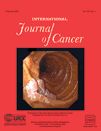MDM2 SNP309 T>G alone or in combination with the TP53 R72P polymorphism does not appear to influence disease expression and age of diagnosis of colorectal cancer in HNPCC patients
Abstract
Disease expression in hereditary nonpolyposis colorectal cancer (HNPCC) cannot be readily explained by mutation site in the respective DNA mismatch repair genes associated with this disorder. One explanation is the role of modifying genes that can either promote or prevent disease development on a background of increased risk. Two single nucleotide polymorphisms in MDM2 and TP53 have been shown to be associated with younger ages of disease onset in HNPCC (TP53) and Li-Fraumeni syndrome (MDM2). In this study 220 HNPCC patients were examined, from Australia and Poland, all characterized at the molecular level to determine the frequency of the MDM2 SNP309 T>G and to assess its influence on disease expression. The results were then pooled with the results of a previous study to assess the combined influence of the MDM2 SNP309 T>G and TP53 SNP R72P. A significant difference was observed between CRC patients and unaffected MMR gene mutation carriers over the age of 45 years (p = 0.01). The unaffected MMR gene mutation carriers over the age of 45 years who carry the G allele have a reduced risk of developing CRC. The results indicate that the MDM2 SNP309, alone or in combination with TP53 R72P, does not influence age of diagnosis of CRC in individuals with HNPCC. In conclusion, the data indicates the G allele of MDM2 SNP309 might have a protective effect on disease development in HNPCC patients and that age of diagnosis of CRC is not associated with MDM2 SNP309 or TP53 R72P either as single SNPs or combined. © 2006 Wiley-Liss, Inc.




